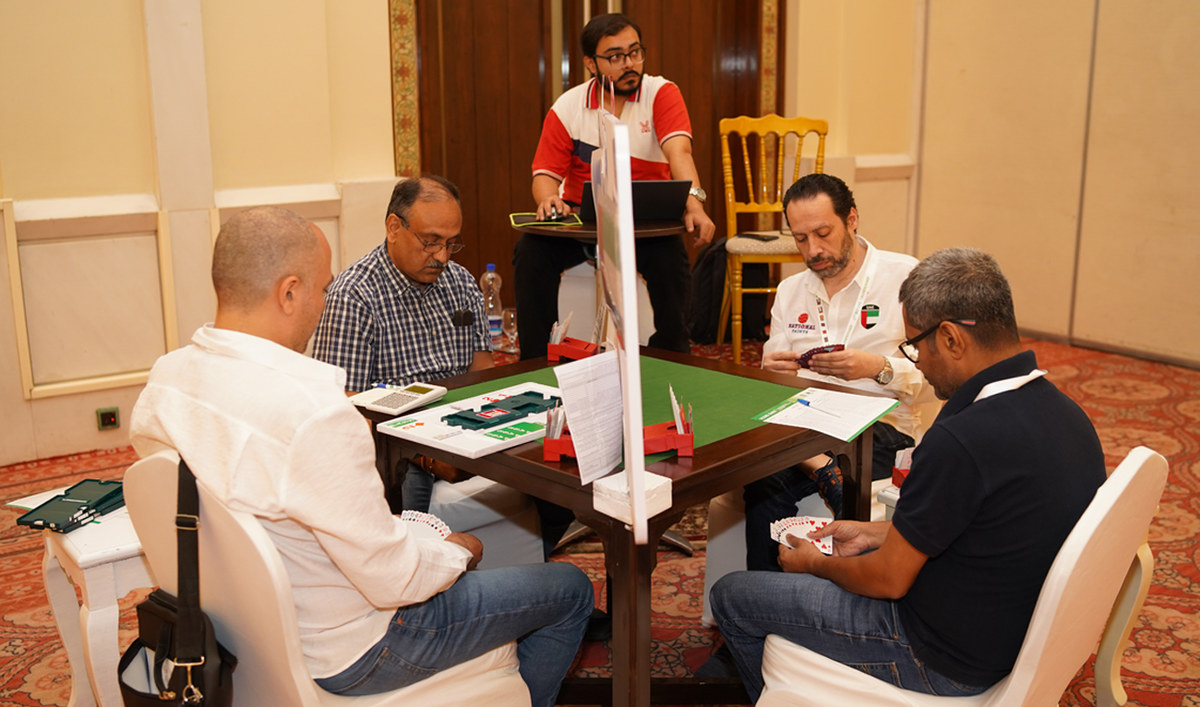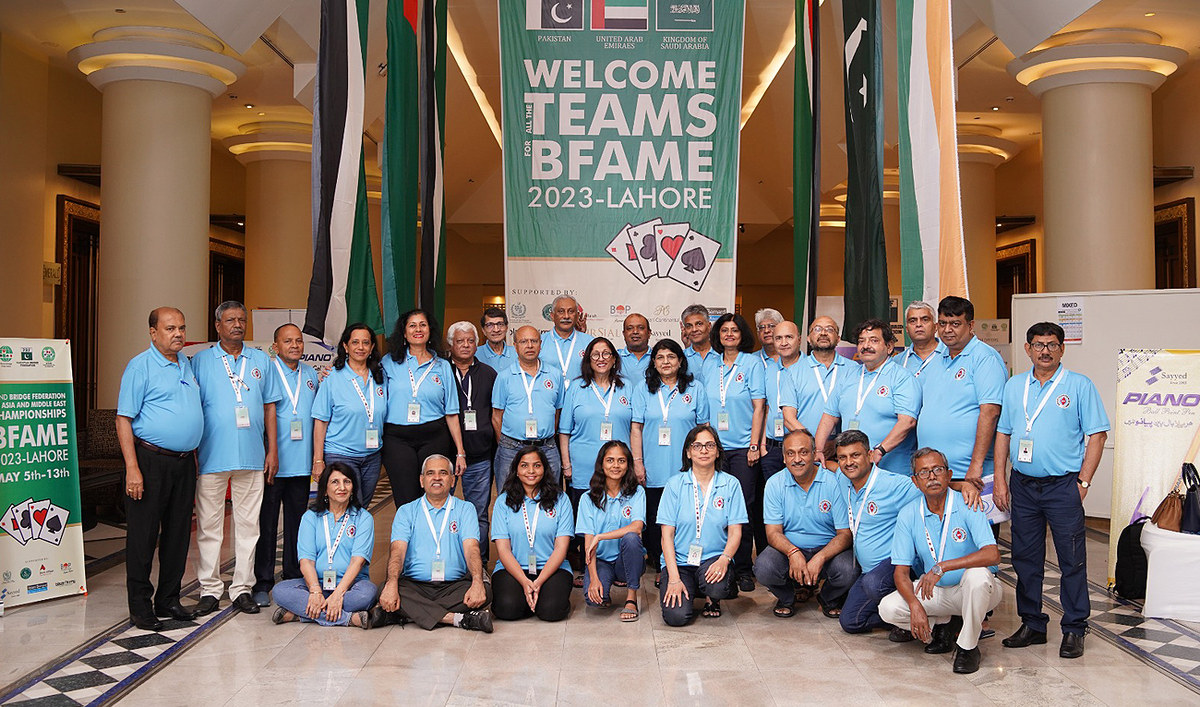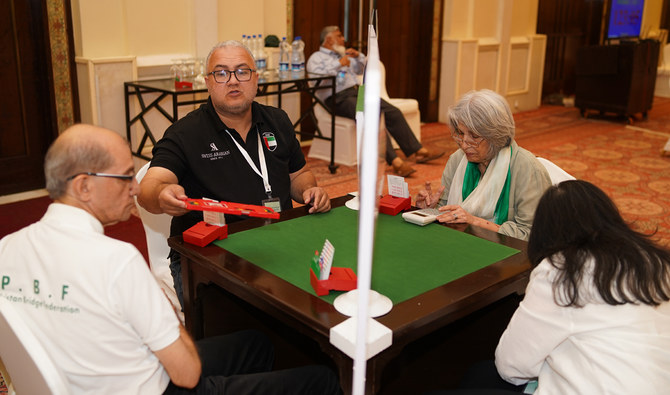LAHORE: India and the UAE were big winners of a major Asia and Middle East bridge championship held in Lahore this week, with 78 foreign players including a Palestinian women’s team that made it all the way to the semifinals.
The 22nd biennial Bridge Federation of Asia and Middle East (BFAME) Championship 2023 took place from May 5 to 13 and was hosted by Lahore for the very first time. It has previously been held in Karachi in 1985 and 2007.
The tournament was held at the Pearl Continental Hotel and featured 102 players including 24 from India, 24 from Jordan, 18 from the UAE, and six each from Palestine and Bangladesh. It also featured four categories, Open, Women, Mixed, and Seniors (aged 60 plus). Six senior players from Saudi Arabia were unable to make the journey due to medical reasons.
India won gold in all categories and the UAE won silver. As a result, both qualified for the Bermuda Bowl — the world championship named after the island that hosted the inaugural tournament — to be held in Morocco this August.
“I was surprised to learn that so many people from different countries were coming to this event,” Chief Minister Punjab Mohsin Raza Naqvi told Arab News after BFAME’s closing ceremony on Saturday evening.
“I feel honored to be welcoming players from the Middle East. I thank everyone for coming to Lahore and I hope they’ll come again.”
“This was one of the most successful zonal championships [the UAE has] had,” Taimur Edis, part of the UAE’s silver winning Mixed team, told Arab News.

Hazem Ghoneim (top right), the silver-winning Open player from the UAE, is playing in the semi-final against Pakistan, in Lahore, on May 12, 2023. (Photo courtesy: Pakistan Bridge Federation)
“We made the finals and will play in the world championship. It was a wonderful experience,” he added, citing Lahore as being a great host city. “Many great memories to take from here.”
While it was Edis’ first time in Pakistan, Hazem Ghoneim of the successful UAE Open team said he had been to Karachi before, almost twenty years earlier. He has played more tournaments than he can keep track of.
“Most people don’t understand that bridge is a very competitive game. It’s very big in the Middle East,” he said.

UAE's silver-winning Open team at the bridge championship in Lahore with Khaled Hassan (middle) and Hazem Ghoneim (to his right) on May 12, 2023. (Photo courtesy: Pakistan Bridge Federation)

UAE's silver-winning Mixed team at the bridge championship in Lahore with Taimur Edis (far left) on May 12, 2023. (Photo courtesy: Pakistan Bridge Federation)
Samer Alrawashdeh, part of Jordan’s Mixed team, explained: “Bridge is very big in Amman. There are a lot of clubs, a lot of tournaments.”
This was his first time playing in Pakistan.
Played in pairs — two versus two — bridge is a card game that involves bidding. The bids you make tell your partner what kind of hand you have been dealt.
Khaled Hassan, Ghoneium’s teammate, said he had been been playing competitive bridge since his early 20s. “The popular misconception is that bridge is an old man’s game,” he told Arab News.
“We do have a separate championship for people under 26, though they can compete in the older brackets as well.”
India’s gold-winning women’s team members were Kalpan Gurjar and Vidhya Patel, 23 and 22 years old respectively. Gurjar said she had been playing bridge for ten years now, ever since her middle school days.
“Even in our villages in Madhya Pradesh, we saw a lot of people play bridge in the evenings, in the cities it’s mostly at member’s clubs.”
She said the game utilized the brain, just like chess. “You have to track all 52 cards in the deck, plan moves in advance.”
The head of the Indian mission, Ranjhan Bhattacharya, was elated with his delegation’s performance:
“We’ve shown India to be a formidable opponent [in bridge] and how seriously we take it … Pakistan have always been regional rivals, sometimes we come out on top, sometimes they do.”
Perhaps the most remarkable story was that of the Palestinian women’s team, which made it to the semifinals despite being the only entrants from the country. The six-member delegation included Laila Khalid Haddadin and Hanan Al Bitar.
The very well-traveled pair have played tournaments all across the Middle East, twice in India and also in Pakistan, Poland, and China. They reside in Jordan.
“We moved to Amman at a very young age. I remember there was a ladies club in my neighborhood, they played bridge every evening,” Bitar told Arab News on Friday.

Palestinian semi-finalists Hanan Al Bitar (2nd from right) and Laila Khalid Haddadin (to her left) at the bridge championship in Lahore on May 12, 2023. (Photo courtesy: Pakistan Bridge Federation)
It wasn’t a smooth sailing to their semifinal berth and the team kept hearing about turmoil back home: “We got news from the West Bank [in between]. Bad news. [But] we carried on. We want to raise the flag of Palestine everywhere we go.”
Haddadin, speaking of her first experience in Lahore, said:
“It’s been wonderful. The organizers made sure everything was catered to. The people are very nice.”
The President of Pakistan Bridge Federation and popular anchorperson, Mubasher Lucman, put the successful hosting of a week-long championship in Lahore down to “good fortune” and his team of organizers.
“It was never going to be easy. Getting some of the finest bridge players in the world under one roof,” he told Arab News. “But we’ve done it. Now we are going to bid for the Bermuda Bowl 2029 in Islamabad.”

Indian team gestures for a group photo during the semifinals of the bridge championship in Lahore on May 12, 2023. (Photo courtesy: Pakistan Bridge Federation)
















